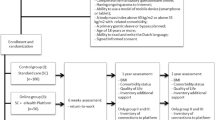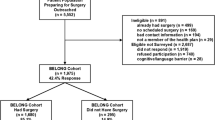Abstract
In the context of escalating obesity rates, bariatric surgery holds a crucial role in managing severely obese patients. With a demonstrated effectiveness in weight loss and with the advent of ambulatory surgery, bariatric surgery allows for a streamlined care pathway, ideally suited for postoperative surveillance using digital health applications. The aim of this systematic review and meta-analysis is to evaluate the effect of eHealth-delivered health services or support for adults undergoing bariatric surgery. Five studies, encompassing 2210 patients, were analysed. The intervention group showed a 10% increase in total weight reduction and a 22% reduction in excess weight loss. ED visitation rates also trended towards reduction. Despite the absence of clear statistical superiority for DHA, the findings suggest potential benefits of DHA in postoperative monitoring.




Similar content being viewed by others
Data Availability
The data presented in this study are available on reasonable request from the corresponding author.
References
Heymsfield SB, Wadden TA. Mechanisms, pathophysiology, and management of obesity. N Engl J Med. 2017;376:254–66.
Blüher M. Obesity: global epidemiology and pathogenesis. Nat Rev Endocrinol. 2019;15(5):288–98. https://doi.org/10.1038/s41574-019-0176-8.
Xie W, Johnston SS, Waggoner JR, et al. Bariatric surgery and weight loss in the short‐ and long‐term: evidence from NHANES 2015–2018. Clin Obes. 2022. https://doi.org/10.1111/cob.12563
Knight SR, Ng N, Tsanas A, et al. Mobile devices and wearable technology for measuring patient outcomes after surgery: a systematic review. NPJ Digit Med. 2021;4:157.
Tevis SE, Kohlnhofer BM, Weber SM, et al. Postdischarge complications are an important predictor of postoperative readmissions. Am J Surg. 2014;208(4):505–10. https://doi.org/10.1016/j.amjsurg.2014.05.013.
Lehmann M, Monte K, Barach P, et al. Postoperative patient complaints: a prospective interview study of 12,276 patients. J Clin Anesth. 2010;22:13–21.
Jaensson M, Dahlberg K, Eriksson M, et al. Evaluation of postoperative recovery in day surgery patients using a mobile phone application: a multicentre randomized trial. Br J Anaesth. 2017;119(5):1030–8. https://doi.org/10.1093/bja/aex331.
Abelson JS, Symer M, Peters A, et al. Mobile health apps and recovery after surgery: what are patients willing to do? Am J Surg. 2017;214:616–22.
Page MJ, McKenzie JE, Bossuyt PM, et al. The PRISMA 2020 statement: an updated guideline for reporting systematic reviews. Rev Esp Cardiol. 2021;74:790–9.
Sterne JA, Hernán MA, Reeves BC, et al. ROBINS-I: a tool for assessing risk of bias in non-randomised studies of interventions. BMJ. 2016;355: i4919.
Higgins JPT, Thompson SG. Quantifying heterogeneity in a meta-analysis. Stat Med. 2002;21:1539–58.
Yang C, Kessler M, Taebi N, et al. Remote follow-up with a mobile application is equal to traditional outpatient follow-up after bariatric surgery: the BELLA pilot trial. Obes Surg. 2023;33:1702–9.
Wild B, Hünnemeyer K, Sauer H, et al. A 1-year videoconferencing-based psychoeducational group intervention following bariatric surgery: results of a randomized controlled study. Surg Obes Relat Dis. 2015;11(6):1349–60. https://doi.org/10.1016/j.soard.2015.05.018.
Versteegden DPA, Scheerhoorn J, Van Himbeeck MJJ, et al. The value of an e-Health platform in bariatric surgery: a retrospective study on the impact on weight loss. Telemed J E Health. 2021;27:1241–8.
Mangieri CW, Johnson RJ, Sweeney LB, et al. Mobile health applications enhance weight loss efficacy following bariatric surgery. Obes Res Clin Pract. 2019;13:176–9.
Heuser J, Maeda A, Yang L, et al. Impact of a mobile app to support home recovery of patients undergoing bariatric surgery. J Surg Res. 2021;261:179–84.
Lauti M, Kularatna M, Pillai A, et al. A randomised trial of text message support for reducing weight regain following sleeve gastrectomy. Obes Surg. 2018;28:2178–86.
Spetz K, Hult M, Olbers T, et al. A smartphone application to improve adherence to vitamin and mineral supplementation after bariatric surgery. Obesity. 2022;30:1973–82.
Doğan SD, Arslan S. The effects of e-Mobile training and consultancy services on bariatric surgery patients: a randomized clinical trial. Obes Surg. 2022;32(11):3650–7. https://doi.org/10.1007/s11695-022-06255-x.
Lazzati A, Salaün-Penquer N, Ortala M, et al. Trends in metabolic bariatric surgery in adolescents in France: a nationwide analysis on an 11- year period. Surg Obes Relat Dis. 2021;17(9):1566–75. https://doi.org/10.1016/j.soard.2021.05.027.
Alalwan AA, Friedman J, Park H, et al. US national trends in bariatric surgery: a decade of study. Surgery. 2021;170:13–7.
Robinson A, Husband AK, Slight RD, et al. Digital technology to support lifestyle and health behaviour changes in surgical patients: systematic review. BJS Open. 2021;5. https://doi.org/10.1093/bjsopen/zraa009
Wright C, Mutsekwa RN, Hamilton K, et al. Are eHealth interventions for adults who are scheduled for or have undergone bariatric surgery as effective as usual care? A systematic review. Surg Obes Relat Dis. 2021;17(12):2065–80. https://doi.org/10.1016/j.soard.2021.07.020.
Messiah SE, Sacher PM, Yudkin J, et al. Application and effectiveness of eHealth strategies for metabolic and bariatric surgery patients: a systematic review. Digit Health. 2020;6:2055207619898987.
Zhang MWB, Ho RCM, Hawa R, et al. Analysis of the information quality of bariatric surgery smartphone applications using the Silberg scale. Obes Surg. 2016;26:163–8.
Stevens DJ, Jackson JA, Howes N, et al. Obesity surgery smartphone apps: a review. Obes Surg. 2014;24:32–6.
Gorecki P, McClelland PH, Kabata K, et al. Weight loss dynamics following laparoscopic Roux-en-Y gastric bypass. An analysis of 10-year follow-up data. Surg Endosc. 2021;35:5315–21.
Wild B, Hünnemeyer K, Sauer H, et al. Sustained effects of a psychoeducational group intervention following bariatric surgery: follow-up of the randomized controlled BaSE study. Surg Obes Relat Dis. 2017;13:1612–8.
El Ansari W, Elhag W. Weight Regain and insufficient weight loss after bariatric surgery: definitions, prevalence, mechanisms, predictors, prevention and management strategies, and knowledge gaps-a scoping review. Obes Surg. 2021;31:1755–66.
Odom J, Zalesin KC, Washington TL, et al. Behavioral predictors of weight regain after bariatric surgery. Obesity Surgery. 2010;20(3):349–56. https://doi.org/10.1007/s11695-009-9895-6.
Kim HJ, Madan A, Fenton-Lee D. Does patient compliance with follow-up influence weight loss after gastric bypass surgery? A systematic review and meta-analysis. Obes Surg. 2014;24:647–51.
Hlavin C, Ingraham P, Byrd T, et al. Clinical outcomes and hospital utilization among patients undergoing bariatric surgery with telemedicine preoperative care. JAMA Netw Open. 2023;6: e2255994.
Author information
Authors and Affiliations
Corresponding author
Ethics declarations
Ethical Approval
For this type of study, formal consent is not required.
Informed Consent
Informed consent does not apply in this study.
Conflict of Interest
The authors declare no competing interests.
Additional information
Publisher's Note
Springer Nature remains neutral with regard to jurisdictional claims in published maps and institutional affiliations.
Rights and permissions
Springer Nature or its licensor (e.g. a society or other partner) holds exclusive rights to this article under a publishing agreement with the author(s) or other rightsholder(s); author self-archiving of the accepted manuscript version of this article is solely governed by the terms of such publishing agreement and applicable law.
About this article
Cite this article
Farinella, E., Koliakos, N., Papakonstantinou, D. et al. The Utilisation of Digital Applications for Measuring Patient Outcomes Following Bariatric Surgery: a Systematic Review and Meta-analysis of Comparative Studies. OBES SURG 34, 635–642 (2024). https://doi.org/10.1007/s11695-023-07000-8
Received:
Revised:
Accepted:
Published:
Issue Date:
DOI: https://doi.org/10.1007/s11695-023-07000-8




